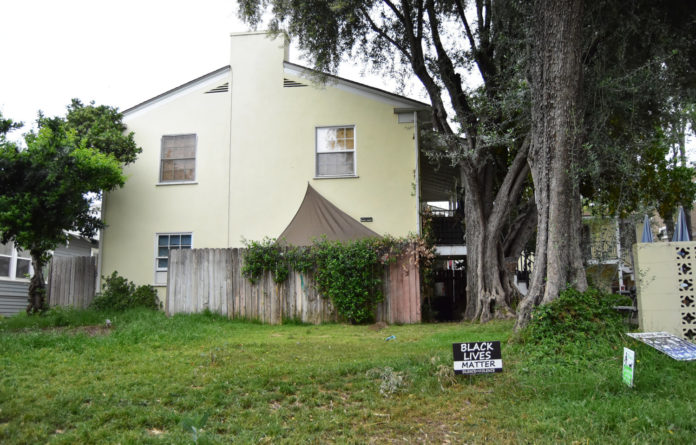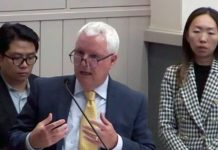
In an escalation of the battle over who should have the right to purchase a 12-unit Caltrans property in South Pasadena, the City has asked a court to rescind Caltrans’ deal to sell the property to Pasadena’s Friendship Baptist Church and instead offer it to South Pasadena’s housing authority.
Both the City and church want to develop 626 Prospect as affordable housing that prioritizes existing tenants of the building, which is among those Caltrans acquired in the 1960s for the now defunct SR-710 extension. In fall of 2019, the church, the City, and another nonprofit group filed bids under Caltrans’ Affordable Sales Program (ASP) for the structure. Last November, Caltrans opted to sell it to Pasadena Friendship Community Development Corp., a nonprofit 501(c)(3) that serves as the church’s development arm.
The City said it “filed suit to enforce the rules under the Roberti Act and Caltrans’ own regulations.” Under those rules, it said Caltrans is required to give the City’s offer preference over those from entities lower on the “waterfall” of eligible buyers as enumerated under Roberti.
Working under a memorandum of understanding with two partners — Heritage Housing Partners (HHP), a California nonprofit affordable housing developer, and New Prospect Housing, a group of 626 Prospect residents — the City offered $879,000 for the property. Its plan was “to make improvements and repairs and to preserve housing opportunities to purchase or rent to existing tenants,” the City said in a statement. “But Caltrans ignored the priority rules and instead offered the property to a non-public entity.”
Pasadena Friendship offered Caltrans $1.31 million for the property and included plans for energy-efficiency and upgrades such as a community garden. It is “committed to the reinvestment of affordability projects” and said it would market the property to “workforce, seniors and current tenants.”
Only five of the 12 units are currently occupied.
Escrow on Caltrans’ deal with the church is set to close July 2.
Brad L. Fuller, a former Pasadena assistant city attorney who represents Pasadena Friendship, told the South Pasadenan News he thinks the City “is trying to frustrate the transaction.” But he sees no authority under Roberti for South Pasadena’s position. “We don’t think there is any real merit to the suit.”
Pasadena Friendship is not a defendant in the case. But Fuller said “we will take whatever steps necessary to assure that we can close this transaction.”
Caltrans declined to respond to questions about the litigation or about the terms and status of its deal with the church.
But in a six-page, May 7 letter to the City, Caltrans District 7 Director Tony Tavares said the city’s interpretations of Roberti and APS rules “are incorrect.”
He wrote the city’s offer did not constitute a bid from a “public housing-related entity” because the city’s partner, Heritage Housing Partnership, is not a public entity. “Neither HHP nor its partnership with the City meet the regulatory definition of designated housing-related public entity. Second, HHP’s bid was so defective that even if Caltrans considered it without competition from other [housing-related entities], Caltrans would have rejected it.” That, he said, is because the offer did not account for a required “equity” payment towards a state affordable housing fund of proceeds HHP and the City would realize from the sale of two of the 12 units to the existing occupants at fair market value.
In its complaint, the city does not address the status of HHP but points out its housing authority is a public entity. It says the equity payment provision “does not apply to subsequent sales to current occupants at fair market value” and so the city “is not obligated to deposit any net proceeds” to the state housing fund. Doing so would add transaction costs, and in any case the City intends to use the proceeds for the same purpose, namely, to “subsidize development of the other units as affordable housing.”
In his letter, Tavares said Caltrans brought its concern about the equity payment to HHP during discussions about the offer, but that they were not resolved. “To the contrary, after Caltrans had expressed serious concern about the lack of any net equity payment, HHP’s doubling down on its position was more concerning.”
The complaint, filed June 2 at the county courthouse in Pasadena, comes as the City of South Pasadena is simultaneously working a two-pronged strategy to acquire all 68 of Caltrans’ surplus properties in town, which includes two vacant lots, 56 single- and 10 multi-family buildings.
One prong is to amend the Roberti Act to facilitate a sale to the City at Caltrans’ original, 1960s-era acquisition costs–estimated to be in the low single-digit millions—through a city-sponsored bill, SB 381, authored by Sen. Anthony Portantino (D-25th). As a condition, the properties would be covenanted to operate as affordable housing for 55 years.
The second prong is a bilateral negotiation with Caltrans to achieve the same outcome, overseen by an ad hoc subcommittee appointed in April by the City Council and consisting of Council Members Jon Primuth and Michael Cacciotti, a former Caltrans attorney.
Asked how the lawsuit might affect either strategy, the city said in a statement it “cannot discuss its litigation strategy.” But Primuth told the South Pasadenan News that when the Council voted in closed session to pursue the compliant, “you can assume that we looked at the impact from every different angle, at all the players and the many different pieces moving around. It was something we considered and decided to move forward with.”
Primuth confirmed the ad hoc subcommittee has had only one formal meeting and has yet to formally approach Caltrans. “We are putting together a strategy” and won’t approach Caltrans until there is a plan supported by tenants, legislators, the community, and staff. It is also working to determine if there will be “regional cooperation” with neighboring jurisdictions, such as Pasadena, that also have Caltrans surplus properties in the former SR-710 extension corridor.
The subcommittee can take two routes, Primuth said—work with stakeholders on an informal process to transfer the homes under the current Roberti rules, or do so under the rules ultimately adopted under SB 381. “I am focused on looking at which path is best for our community, the city and tenants and in light” of the limited staff the city can spare for such an effort. The work will include gathering considerable data from Caltrans on the maintenance and condition of the properties themselves to determine, among other things, rehabilitation costs.
Meantime, SB 381 passed the Senate June 1 on a vote of 39-0. It did so despite questions raised in a staff report about amendments adopted May 20, such as whether it is fair that Caltrans, in addition to the foregone revenue due to the requirement it sell the properties at its original acquisition cost, will have to pay inspection and repair costs—“likely in the millions”–for single family homes, including historic properties, while the proceeds from any resales will go to the city.
Primuth noted the law provides that the sales proceeds go to promote low-income housing regardless whether they are accrued by Caltrans or the City.
Another staff report noted that, in response to separate litigation, Caltrans is currently revising its Affordable Sales Program rules “to permanently adopt inflation-adjusted pricing” that would ensure any future sales are not offered at original acquisition costs.
“There were a number of comments that SB 381 may not survive the legislative process as a clean bill with all the provisions we wanted, so what you are seeing is the risk we anticipated,” Primuth said. He noted Portantino has “considerable influence” in the legislature and expressed confidence any objections from Caltrans can be addressed.
SB 381 currently awaits action in the Assembly.
Meantime Sen. Elena Duranzo (D-24)’s SB-51, a separate bill to encourage sale of former SR-710 extension properties in El Sereno, is also working its way through the Assembly.
“Asm. Chris Holden (D-41)’s AB-512, requiring Caltrans to sell unimproved property within the SR-710 corridor in the cities of Los Angeles, Pasadena and South Pasadena, was approved by the Assembly and awaits action in the Senate Appropriations Committee chaired by Portantino.”
















.png)






